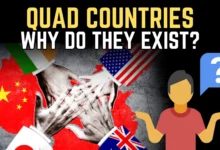Role of India in United Nations
ROLE OF INDIA IN UNITED NATIONS
INTRODUCTION
India, being a potential superpower, has a growing international influence all around the world. With a great history of collaboration, it has played a pivotal and influential role in various international organizations like the United Nations (UN), the World Trade Organization(WTO), the International Monetary Fund (IMF), the Shanghai Cooperation(SCO), BRICS, G7, SAARC, UNESCO and many more.
Let’s try to explore the role of India in the United Nations by analyzing various parameters from the past and present,
The United Nations
Founded: 24 October 1945(India is one of the founding members)
HQ: New York, United States
Member states: 193
Objective: To maintain international peace and security, upholds international law, protects human rights and promotes democracy.
QUOTES
“More than ever before in human history, we share a common destiny. We can master it only if we face it together. And that, my friends, is why we have the United Nations.” – Kofi Annan
“The United Nations is our one great hope for a peaceful and free world” – Ralph J. Bunche
STATISTICS – What numbers have to Say?
- India’s participation – 49 Peacekeeping missions
- Troop contribution – around 2,40,000
- As of January 2020, India became the fourth largest troop contributor to UN missions. It also contributed heavily to the first female formed Police Unit.
- As of 2020, 169 Indians have made supreme sacrifices while serving in UN peacekeeping operations, the highest total from any troop-contributing country.
- Fund contributed – $1 million to the UN fund for various development programs.
- In the year 2020 – The amount of USD 13.5 million is being pledged to contribute to various operational activities.
HISTORY
- In 1945, nations were in ruins. World War II was over, and the only thing world wanted was peace.
- So, 51 countries gathered in San Francisco that year in order to sign a document.
- It was nothing but a charter, creating a new organisation, the United Nations.
- 70 years later, the United Nations is maintaining security and international peace along with promoting development and giving humanitarian assistance to those in need.
DESCRIPTION – Let’s take a Deep Dive
Organs of UN
The system consists of 6 principal organs:
- General assembly: It is the main policymaker and representative organ of the UN.
- The security council: It is responsible for the maintenance of international security and peace.
- The economic and social council: UN Economic and social council (ECOSOC) objective is to promote social progress and better standards of life.
- The trusteeship council: It was established to supervise its 11 Trust Territories and preparing them for self-government and independence.
- The international court of justice: It is the main judicial and decision making organ.
- The secretariat: It carries out the day-to-day work as mandated by the General Assembly.
India and the UN
India, so far, has been a member of the UNSC for seven terms (recent being the 2011–12 term).
*UNSC – United Nations Security Council
Some important cases of India in UN:
- Kuljhadav case
- Kashmir issue
- Abrogation of article 370
- Pulwama attack
- CAA
Recent case:
COVID 19
UNITED NATIONS: The body has expressed a deep solidarity with India’s stand. It has supported the fight against coronavirus, along with praising PM’s efforts and nationwide lockdown. It recognized the step as a “comprehensive and robust” response to the COVID-19 pandemic. It has also asked to act together to lessen the current blow to the people.
Seeking of Permanent Seat in UNSC
- We have been seeking a permanent seat on the United Nations Security Councilsince 1994.
- The Russian Federation, United States, United Kingdom and France support India gaining permanent seats.
- India is also a part of G4, (Brazil, Germany, Japan, and India) -all are currently seeking permanent representation.
- China, which is one of permanent member of United Nation has veto power. It has been stonewalling our efforts to seek permanent membership.
Why India cannot seek permanent membership of the UNSC?
- All P5 (USA, UK, Russia, China and France) countries are the countries who won WW2. But India was not one of the major powers.
- The Pressure Group, G4 (India, Brazil, Germany, and Japan) has made India’s bid in UNSC more complicated. The reason being Brazil is opposed by Mexico, Japan is opposed by China and Germany is opposed by Italy.
- Most importantly, P5 countries would not like to share this special power with anyone. Less the member less the complications in decision making.
- Emerging tensions with Pakistan, who is backed by China in the UN every time.
Why India should be given a permanent place at UNSC?
- India is one of the biggest troop contributors and gave the most sacrifices for world peace.
- India has shown its potential and becomes a major player not only in the Asia but also in the world.
- India’s fruitful efforts in Afghanistan have been very successful and peaceful. It has built there a parliament (a sign of democracy), a library and many more.
- India has been continuously supporting neighboring countries and involved in capacity building
- It’s the world’s largest democracy and a large financial
- It has the backing of some important players (Russia, France, United Kingdom, United States) and a number of other nations.
- It’s moreover a trusted state, that can negotiate in the Middle East.
CONCLUSION
On 11 December 2014, the United Nations General Assembly adopted without a vote of a resolution commemorating 21 June as International Yoga Day making a red-letter day for India.
In 2015, the Republic of India became the world’s fastest-growing economy with a 7.5% estimated GDP rate and is being considered as one of the emerging superpowers of the world. The country must overcome many social, economic, and political problems so that it becomes more influential not only in Asia but also in various international platforms like the UN, before it can be considered as a superpower. The day is not so far when India will also be playing a crucial role in leading the world.
Author: Priyanka Mahala
Must Explore


